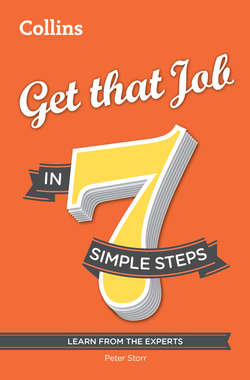Читать книгу Get that Job in 7 simple steps - Peter Storr - Страница 9
What does this mean for getting that job?
ОглавлениеBy now it will be clear that, today, merely sending off a few CVs to a few organisations you like the sound of and hoping for the best just doesn’t cut the mustard. You need to be proactive, to have a plan or a strategy for job hunting because job hunting is best thought of as a process; a sequence of steps that should be followed to maximise your chances of success. The simple truth is that employers expect prospective employees to show initiative and take charge of their own destinies. Taking the initiative is not about being aggressive, arrogant or overbearing. It’s about deciding to make things happen and then creating a plan to make them more likely to.
While it’s not always easy, and at times may be frustrating and disheartening, many people find it rather satisfying to make a plan and monitor its progress, analysing the results and learning from what worked and what didn’t. If you can share your plans, ideas, successes and failures with others who are in the same position as you, then that extra support and mutual encouragement can be invaluable. You also need to periodically review your plans and give them occasional reality checks. There is a saying: ‘The first sign of madness is to keep on doing the same things and expecting different results.’ If something seems not to be working, change it!
Your ‘Getting that job’ plan
So, what might your ‘Getting that job’ plan look like? The precise nature and components of your plan depend on the type of job you’re looking for. Graduate and managerial job selection processes often include assessments such as a presentation, role-play exercises or exercises that assess planning and organisational abilities. Other jobs may have manual dexterity tests or verbal/numerical reasoning tests or personality assessments, but essentially they are all just ways of ensuring that you fit the job and that the job fits you.
Most plans tend to cover the following areas:
Stage 1: Doing the groundworkResearching, networking, creating a plan, deciding what you want, clarifying your skills and strengths (see Steps 1, 2 and 3 of this book)
Stage 2: Getting ready to applyCreating a CV template, building a portfolio of evidence of competencies (see Step 4)
Stage 3: Preparing for interviewing and other assessmentsPresenting yourself, preparing for typical interview questions and understanding what assessments are likely to be used (see Steps 5 and 6)
Stage 4: Reviewing progress and keeping up to dateReviewing your job search process: what went well, what you could do differently next time, what development is needed
By following a process like this, you’ll put yourself in the best possible position to get that job.
Networking in your job search
It should now be clear that to be successful in job hunting, as in anything, it’s best to seize the initiative, to take control of the job hunting process – and to treat it like a process. Later steps in this book will take this a stage further, when we look at what you want to achieve and why you are the ideal candidate for specific jobs. Identifying the actions required during Step 1 will be easier if you’re aware of how you might find a job to apply for in the first place.
Of course, you may hear about a job through a relative, friend or someone you know. There’s nothing wrong with this – far from it – and your chances of this happening are greatly increased if you widen your circle of contacts. Most of us do this naturally and spontaneously, but we can (and should) also be more targeted and strategic about it. This is called ‘networking’. Think about your reactions to that word. As soon as we make it sound formal, a ‘thing’ we should be doing, it suddenly becomes scary. It’s worth practising and persevering though; a great many people become aware of a potential opportunity through someone they know.
Remember that this is not about getting an unfair advantage over others or being neatly slotted into a vacancy. When we have a good network we simply hear about more opportunities than we would otherwise – and there are more people potentially looking out for us.
